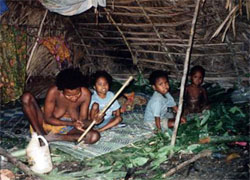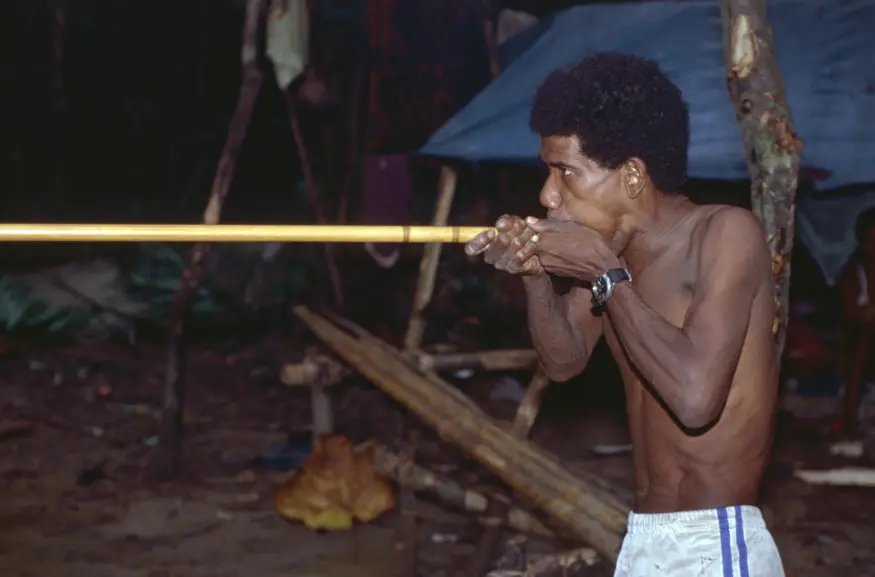Post from Michelle:
 While in the jungle, Tim and I took a tour of the "Batek" people, the Orang Asli - the Malaysian aborigines who live in the jungle. Our guide, Ismail, was a local Malaysian who lived in the village where we were staying. After a short boat trip up the river we landed on a sandy shore. We climbed up a muddy, steep bank and then walked down a path into the jungle. It was evening and the sun was setting. After a couple minutes of walking we arrived in a large clearing. Many eyes stared at us from the dark shadows of the crude shelters before us. The batek people live in simple structures floored of wood and roofed with woven dried leaves.
While in the jungle, Tim and I took a tour of the "Batek" people, the Orang Asli - the Malaysian aborigines who live in the jungle. Our guide, Ismail, was a local Malaysian who lived in the village where we were staying. After a short boat trip up the river we landed on a sandy shore. We climbed up a muddy, steep bank and then walked down a path into the jungle. It was evening and the sun was setting. After a couple minutes of walking we arrived in a large clearing. Many eyes stared at us from the dark shadows of the crude shelters before us. The batek people live in simple structures floored of wood and roofed with woven dried leaves. Ismail sat us down on benches and started to explain their culture. They did not speak Malaysian or English, so they just stared and watched us. I was amazed at the number of children. It is not certain their origin, but they looked African with their dark skin and curly hair. They are nomadic, moving five to six times a year and are reliant on the jungle to survive.
 They mostly eat vegetables and fruits, but also eat small animals from the jungle û barking deer, monkeys, and squirrels. They use long blowpipes and small poisonous darts as their weapons. The pipes and darts are made of bamboo and the poison is from the sap of a tree. The poison is so strong it kills humans in two to three minutes. We were given a demonstration of how the blowpipe is used. A tribesman blew one of the darts into a small target on a distant tree. Impressive! I thought to myself, I would never want to meet one in the jungle as an enemy!
They mostly eat vegetables and fruits, but also eat small animals from the jungle û barking deer, monkeys, and squirrels. They use long blowpipes and small poisonous darts as their weapons. The pipes and darts are made of bamboo and the poison is from the sap of a tree. The poison is so strong it kills humans in two to three minutes. We were given a demonstration of how the blowpipe is used. A tribesman blew one of the darts into a small target on a distant tree. Impressive! I thought to myself, I would never want to meet one in the jungle as an enemy!As we were sitting there, Tim nudged me to look at a young boy sitting a few meters from us on a log. From his lips hung a cigarette and he was intensely carving with a ferocious looking knife. He looked about 6 years old but had the presence of an adult. Our guide said they start smoking at four or five and work with knives from the time they are able to hold them. Looking around I saw some toddlers playing with fire and others using large knives. In the States, children that age would just be beginning to play with Legos.
The batek people don't have a specific religion but are spiritual people. When an adult dies, the men take the body deep into the jungle and climb to the top of a very high tree. There they build a platform and place the dead body, wrapped in a blanket and leaves, on top. They believe that when an adult dies, the body is full of sin. By placing the body high in the tree, the rain can wash their sin to the ground and free their spirit to enter heaven. Children are born pure and have no sin yet û so they are buried in the ground.
The longer we stayed, the friendlier the children became. They never approached us but the girls would smile and giggle, hiding behind the adults. The women and men mostly just watched us curiously, but rarely returned a smile. It was hard for me to imagine their life in the jungle and the generations of wisdom they possessed about using the plants and animals in the jungle to survive.
Photos From This Location
